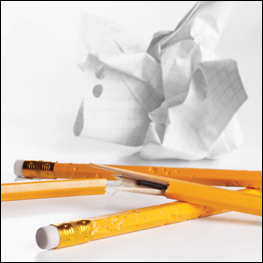
Your child brings home a bad report card. Your first instinct may be to punish them in order to make them raise their marks. However, will that really solve the problem?
We know from research in the workplace that punishment never solves motivation or performance problems, so why would it work for children? What can you do to encourage them instead? It’s good to keep in mind that a report card is only one ‘view’ of your child. It’s a picture to report to parents what the child is like in school. However, your child is a multifaceted learner with strengths and there’s room for improvement in all areas of their life, same as anybody. Think of your child’s performance like a three-legged stool. All three legs are required for the stool to function and all perspectives can give an accurate assessment of the child as a learner.
One leg of the stool is from the teacher who gives an academic skills report. This report should include information on how the child is doing learning subject matter in the four cores of math, language arts, science, social studies and options. Schools like to report on character and other things that are not academic, but they only see the child participating in an institutional setting with many peers. The teacher does not see the child at home, or ‘outside of school’ social situations.
The other leg is the parent who also gives a report card on two of the most important learnings: life skills and people skills. The parent can present the report card to the child at any given time. Life skills include chores, money management, organization skills, problem-solving, initiative, responsibilities, health and well-being maintenance, and volunteer commitment. In other words - all the skills that parents witness at home. People skills include sharing, sibling conflict resolution, attitude, listening, assertiveness, politeness, emotional intelligence at home and out in social situations. Most people with academic and technical brilliance lose their jobs not because of inefficiency in that area, but because of lack of people and life skills. These are the some of the most important skills to develop. These skills can be learned and practiced by all children. Not all children can get an ‘A’ in math, but all children can learn to be polite and organized.
The final leg of the three-legged stool is the child. They can self-evaluate and give themself a report card on all three components: academic skills, life skills and people skills. This is the most important evaluation, and parents and teachers can ask how they can support growth and success for the child in all these areas.
Finally, the parent, teacher and child should discuss where the strengths are and room for improvement, and come to an agreement on how to go about setting improvement in place. Education is a journey, not a race. The letter or number grade does not indicate learning or self-awareness. In fact, when children only chase a grade, they can be more prone to cheating and learn nothing. We learn the best when we fail or make mistakes which over insight and reflection, give us ideas for change. When children make mistakes, ask them, “What did you learn from this?” The ability to self-evaluate and find motivation to start again is the real learning and the utmost key to success. The Winklevoss twins learned more about life and resilience in their court battle with Facebook, than all those academic years at Harvard.
Parents, de-emphasize the numbers. As a society, we tend to treasure what we measure, but learning can’t be denigrated to a number. Most of what we do in life that really counts; love, help, volunteering, life learning and kindness can’t be evaluated by a number, but can be observed, noticed and appreciated.
No one is perfect, and we all have room for improvement. Your job as parents is to figure out with your child, how can you pick them up, dust them off and support them moving forward.
Judy is an international, award-winning, peaceful parenting speaker and bestselling author of Discipline Without Distress: 135 tools for raising caring, responsible children without time-out, spanking, punishment or bribery and the DVD, Plugged-In Parenting: Connecting with the Digital Generation for Health, Safety and Love. She is also author of the new book, The Last Word on Parenting Advice. For more information, contact 403-714-6766, email This email address is being protected from spambots. You need JavaScript enabled to view it. or visit www.professionalparenting.ca. Judy is also co-founder of Attachment Parenting Canada, 403-667-4557 or visit www.attachmentparenting.ca.
Calgary’s Child Magazine © 2024 Calgary’s Child